The code comes from here
Given that in C++ you can use C libraries would you say that the following code is a legitimate C++ code? If not what changes need to be applied?
This code compiles with g++ and runs as expected.
UPDATE: Thank you for all answers. I'm still slightly confused as there's no agreement on whether or not this code comply with C++ standards. Will ask another question to dispel my doubts
UPDATE2: To moderators who closed this question: Just noticed that the question has been closed which I think is ridiculous. It's a down-to-earth technical question and I received down-to-earth technical answers.In case you haven't read fully the whole thread, here's the visual representation of the conclusion we've agreed on:

Clearly C++ is not a superset of C.
Closing questions that deal with coding standards is just wrong.
Client:
#include <stdio.h>
#include <stdlib.h>
#include <unistd.h>
#include <errno.h>
#include <string.h>
#include <netdb.h>
#include <sys/types.h>
#include <netinet/in.h>
#include <sys/socket.h>
#include <arpa/inet.h>
#define PORT "3490" // the port client will be connecting to
#define MAXDATASIZE 100 // max number of bytes we can get at once
// get sockaddr, IPv4 or IPv6:
void *get_in_addr(struct sockaddr *sa){
if (sa->sa_family == AF_INET) {
return &(((struct sockaddr_in*)sa)->sin_addr);
}
return &(((struct sockaddr_in6*)sa)->sin6_addr);
}
int main(int argc, char *argv[]){
int sockfd, numbytes;
char buf[MAXDATASIZE];
struct addrinfo hints, *servinfo, *p;
int rv;
char s[INET6_ADDRSTRLEN];
if (argc != 2) {
fprintf(stderr,"usage: client hostname\n");
exit(1);
}
memset(&hints, 0, sizeof hints);
hints.ai_family = AF_UNSPEC;
hints.ai_socktype = SOCK_STREAM;
if ((rv = getaddrinfo(argv[1], PORT, &hints, &servinfo)) != 0) {
fprintf(stderr, "getaddrinfo: %s\n", gai_strerror(rv));
return 1;
}
// loop through all the results and connect to the first we can
for(p = servinfo; p != NULL; p = p->ai_next) {
if ((sockfd = socket(p->ai_family, p->ai_socktype,
p->ai_protocol)) == -1) {
perror("client: socket");
continue;
}
if (connect(sockfd, p->ai_addr, p->ai_addrlen) == -1) {
close(sockfd);
perror("client: connect");
continue;
}
break;
}
if (p == NULL) {
fprintf(stderr, "client: failed to connect\n");
return 2;
}
inet_ntop(p->ai_family, get_in_addr((struct sockaddr *)p->ai_addr),
s, sizeof s);
printf("client: connecting to %s\n", s);
freeaddrinfo(servinfo); // all done with this structure
if ((numbytes = recv(sockfd, buf, MAXDATASIZE-1, 0)) == -1) {
perror("recv");
exit(1);
}
buf[numbytes] = '\0';
printf("client: received '%s'\n",buf);
close(sockfd);
return 0;
}
Server:
#include <stdio.h>
#include <stdlib.h>
#include <unistd.h>
#include <errno.h>
#include <string.h>
#include <sys/types.h>
#include <sys/socket.h>
#include <netinet/in.h>
#include <netdb.h>
#include <arpa/inet.h>
#include <sys/wait.h>
#include <signal.h>
#define PORT "3490" // the port users will be connecting to
#define BACKLOG 10 // how many pending connections queue will hold
void sigchld_handler(int s){
while(waitpid(-1, NULL, WNOHANG) > 0);
}
// get sockaddr, IPv4 or IPv6:
void *get_in_addr(struct sockaddr *sa){
if (sa->sa_family == AF_INET) {
return &(((struct sockaddr_in*)sa)->sin_addr);
}
return &(((struct sockaddr_in6*)sa)->sin6_addr);
}
int main(void){
int sockfd, new_fd; // listen on sock_fd, new connection on new_fd
struct addrinfo hints, *servinfo, *p;
struct sockaddr_storage their_addr; // connector's address information
socklen_t sin_size;
struct sigaction sa;
int yes=1;
char s[INET6_ADDRSTRLEN];
int rv;
memset(&hints, 0, sizeof hints);
hints.ai_family = AF_UNSPEC;
hints.ai_socktype = SOCK_STREAM;
hints.ai_flags = AI_PASSIVE; // use my IP
if ((rv = getaddrinfo(NULL, PORT, &hints, &servinfo)) != 0) {
fprintf(stderr, "getaddrinfo: %s\n", gai_strerror(rv));
return 1;
}
// loop through all the results and bind to the first we can
for(p = servinfo; p != NULL; p = p->ai_next) {
if ((sockfd = socket(p->ai_family, p->ai_socktype,
p->ai_protocol)) == -1) {
perror("server: socket");
continue;
}
if (setsockopt(sockfd, SOL_SOCKET, SO_REUSEADDR, &yes,
sizeof(int)) == -1) {
perror("setsockopt");
exit(1);
}
if (bind(sockfd, p->ai_addr, p->ai_addrlen) == -1) {
close(sockfd);
perror("server: bind");
continue;
}
break;
}
if (p == NULL) {
fprintf(stderr, "server: failed to bind\n");
return 2;
}
freeaddrinfo(servinfo); // all done with this structure
if (listen(sockfd, BACKLOG) == -1) {
perror("listen");
exit(1);
}
sa.sa_handler = sigchld_handler; // reap all dead processes
sigemptyset(&sa.sa_mask);
sa.sa_flags = SA_RESTART;
if (sigaction(SIGCHLD, &sa, NULL) == -1) {
perror("sigaction");
exit(1);
}
printf("server: waiting for connections...\n");
while(1) { // main accept() loop
sin_size = sizeof their_addr;
new_fd = accept(sockfd, (struct sockaddr *)&their_addr, &sin_size);
if (new_fd == -1) {
perror("accept");
continue;
}
inet_ntop(their_addr.ss_family,
get_in_addr((struct sockaddr *)&their_addr),
s, sizeof s);
printf("server: got connection from %s\n", s);
if (!fork()) { // this is the child process
close(sockfd); // child doesn't need the listener
if (send(new_fd, "Hello, world!", 13, 0) == -1)
perror("send");
close(new_fd);
exit(0);
}
close(new_fd); // parent doesn't need this
}
return 0;
}